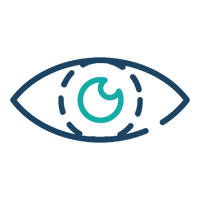Dry eyes affect millions of people around the world. While dry eye may be the result of your contact lens, there are many reasons that you could be experiencing these symptoms. It is always recommended to come in for a dry eye evaluation, during which time our eye doctors will run tests and assess your contact lenses to understand what is causing those symptoms.
Common causes of Dry Eye include: clogged tear ducts, improper blinking, menopause, weather and indoor climate, smoking, among many other reasons. That said, contact lenses are one of the primary causes of dry eyes. While contact lens materials have improved greatly and technology has evolved, there are still many people who suffer from dry eyes as a result of wearing contact lenses. While contact lenses help patients see clearly, they are made of plastic, and the plastic goes on to their eyes, which can partially block oxygen to their eyes, causing dry eyes. Our eyes have tears on the front surface to help keep them moist and lubricated. Putting a contact lens on that eye, however, can absorb some tears. These are some of the reasons why your eyes may feel more dry while wearing them. Often patients will experience this if they have worn their contact lenses for a long time.
How can you avoid contact lens-induced dry eye?
Give your eyes a chance to rest
To avoid the symptoms of dry eyes, it is advised by optometrists to take out your contact lenses and switch to your glasses when you get home from work or school. You should always have your backup glasses at home when you wear contact lenses regularly. Try to give your eyes a chance to rest and breath normally for either a few hours every evening or one full day per week.
Use eye drops to relieve your dry eyes
In order to get immediate relief from dry eyes, artificial tears can be put in the eyes while wearing contact lenses. There are many different types of artificial tears, some are not ideal for contact lens use, while others may not be recommended for extended periods of use. It is always best to speak with your doctor before purchasing artificial tears.
Speak with your optometrist about the best contact lens for your eyes
Certain types of contact lenses permit less oxygen into the eyes than others, while other modalities or brands may feel more comfortable for you. So it is best to talk to your eye care provider about your symptoms and have your eye doctor recommend the best contact lenses for you.
Daily Disposable Lenses
The daily disposable lenses are recommended because a fresh pair is used every morning, reducing the possibility of protein debris building up, and they require no maintenance. Daily disposable lenses allow greater oxygen permeability, which alleviates the symptoms of dry eyes.
Silicone Hydrogel Contact Lenses
The lenses are made from a new, advanced material that is incredibly breathable, much better than standard lenses. Thus, the lenses can be worn for longer periods of time with increased comfort and with a reduced risk of irritation caused by dryness.
Low Water Contact Lenses
Contrary to popular belief, low water content lenses can actually keep the eyes moist better than high water content lenses. The reason for this is that high water content lenses can over time draw water from the tear ducts, causing the eyes to dry out.
Hard Contact Lenses
The use of hard contact lenses, such as scleral lenses and ortho-k lenses, may reduce dry eye symptoms if soft contact lenses are ineffective.
OrthoK Lenses
OrthoK lenses are one of the few kinds of lenses you can sleep with at night, and it reshapes the front surface of your eye, enabling you to see clearly throughout the day after removing the contact lenses in the morning. Since OrthoK lenses are worn while you are sleeping, most patients report having fewer symptoms of discomfort than daily use contact lenses.
Scleral Lenses
Scleral contact lenses are hard contacts that vault over your eye. They are ideal for dry eye sufferers since they contain a pocket that serves as a reservoir for liquid. In addition to the liquid reservoir, they also vault over the more sensitive parts of your eye, which reduces the discomfort that you may experience. Learn more about how scleral lenses work for dry eye syndrome.
Consult Your Eye Doctor
It is possible that an individual's dry eyes are not caused by their contact lenses. A dry eye evaluation is therefore necessary to determine the root cause. However, if you only started to experience dry eye symptoms after switching to contact lenses or after switching brands, it is recommended to schedule a contact lens exam.










